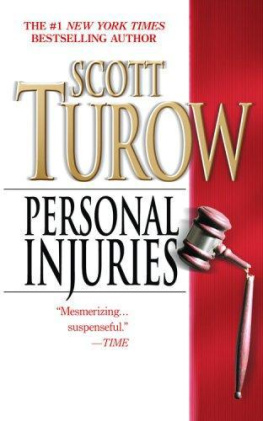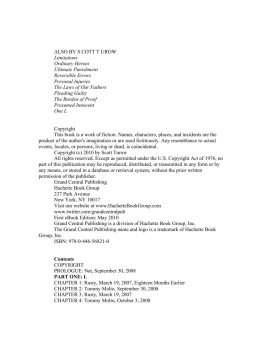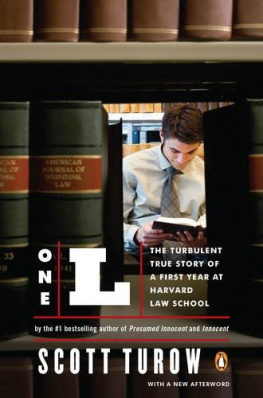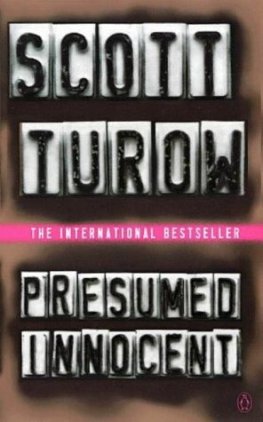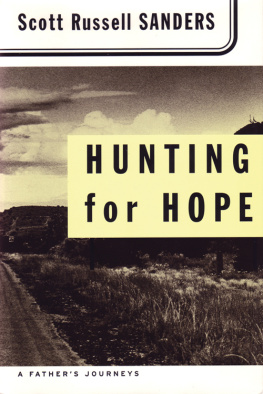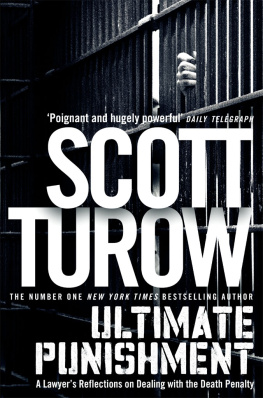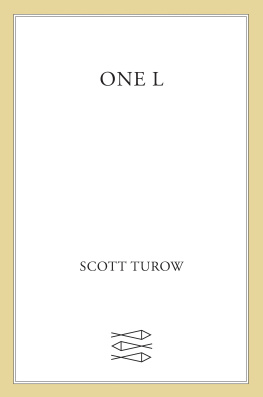Scott Turow - The Laws of our Fathers
Here you can read online Scott Turow - The Laws of our Fathers full text of the book (entire story) in english for free. Download pdf and epub, get meaning, cover and reviews about this ebook. genre: Detective and thriller. Description of the work, (preface) as well as reviews are available. Best literature library LitArk.com created for fans of good reading and offers a wide selection of genres:
Romance novel
Science fiction
Adventure
Detective
Science
History
Home and family
Prose
Art
Politics
Computer
Non-fiction
Religion
Business
Children
Humor
Choose a favorite category and find really read worthwhile books. Enjoy immersion in the world of imagination, feel the emotions of the characters or learn something new for yourself, make an fascinating discovery.

- Book:The Laws of our Fathers
- Author:
- Genre:
- Rating:5 / 5
- Favourites:Add to favourites
- Your mark:
- 100
- 1
- 2
- 3
- 4
- 5
The Laws of our Fathers: summary, description and annotation
We offer to read an annotation, description, summary or preface (depends on what the author of the book "The Laws of our Fathers" wrote himself). If you haven't found the necessary information about the book — write in the comments, we will try to find it.
The Laws of our Fathers — read online for free the complete book (whole text) full work
Below is the text of the book, divided by pages. System saving the place of the last page read, allows you to conveniently read the book "The Laws of our Fathers" online for free, without having to search again every time where you left off. Put a bookmark, and you can go to the page where you finished reading at any time.
Font size:
Interval:
Bookmark:
Scott Turow
The Laws of our Fathers
PART ONE
THOSE OF US BORN IN THE YEARS OF BOUNTY AFTER WORLD War II knew we had a different outlook than earlier generations of Americans. Blinkered by need, they had come of age with narrower commitments to the glory of God, the glee of acquisition, or the mean little business of survival. But we took seriously the promise of the Declaration of Independence that the birthright of America was not merely life or liberty, but the pursuit of happiness. Personally, as a child, I always assumed that was the point of growing up. So I'd feel better than I did then. Which leaves us with the awful doomed inquiry of our middle years, the harpy's voice that whispers in dreams, at sunrise, at those unforeseen instants of drilling isolation: Is this as happy as I will ever be? Do I have the right to just a little more? Or is there nothing better I should hope for?
- MICHAEL FRAIN 'The Survivor's Guide,' September 7, 7995Hardcore
Dawn. The air is brackish, although this place is miles from water. The four high-rise towers hulk amid a hardened landscape of brick, of tar and pavement broken by weeds, of crushed Coke cups and candy wrappers, of fry-about newspaper pages. A silvery bedding of broken glass, the remnants of smashed bottles, glitters prettily one more false promise. It is a time of uncommon quiet. In the night, there are often sounds of life at the extreme: outcries and drunken yells, machines at volume. Sometimes gunfire. The day brings voices, children, the many standabouts, the species at large. Now the wind is up, whistling in the fence links and on the bricks. At the prospect of motion, the man walking this way looks up abruptly, but there is only a dog huddled in a gap between the buildings who, out of some animal instinct, has determined, across the distance of a hundred yards, to have no truck with him. A single used tire sits, inexplicably, on the cracked blacktop of the play yard.
The man, Ordell, is almost thirty-six years old. He still maintains some of his penitentiary build, buffed up, he'd say, although he's been out again four years now. He is dressed simply, black shirt and trousers. No gold. 'Don't wear you no gold when you workin,' he often advises the Unborns, the eight- and nine- and ten-year-old wannabes who trail after him, complimenting his appearance and offering to do him favors, when he arrives here most afternoons. 'Hardcore,' they always goin, 'get you Co-Cola by Ko-rea?' like he don't know they aimin to keep the change.
This morning, Ordell Trent, gang name Hardcore, is alone. The building he approaches, the tallest of the four which comprise the Grace Street Projects, has come over the years to be called by everyone 'the IV Tower,' due supposedly to the Roman numerals, but most suspect the label originated with the familiar mockery of the residents practiced by the police, who refer to the building among themselves as the Ivory Tower. The open structures windows, porches, connecting walkways are caged in mesh of heavy gauge. Formerly, from the gangways and balconies refuse was sometimes thrown, bricks were tossed down on enemies as in the Middle Ages, drunks and dopeheads stumbled to their death, and several persons were pushed. Around three or four windows you can see the ragged blackening marks of bygone fires and at street level, on the bricks, in rounded letters, the initials of Ordell's gang have been inscribed in phosphorescent colors and etched in black: 'BSD.' Black Saints Disciples. His set the branch of the gang which Ordell heads the T-4 Rollers is often celebrated, too, and some daring members of Gangster Outlaws, a rival organization, have also put their marks here, wallbanging, as it is known. Occasional messages of personal affirmation, quickly sprayed, appear now and then as well. 'D'Ron Is Cool.' 'Lucifer!'
Inside, Ordell nods to security, Chuck, he named, chump rent-a-cop from Kindle County Housing Authority, huddled in a concrete shelter with a small window of bulletproof glass. Chuck gettin half-a-one fifty dollars every month from Ordell, and Chuck, he like to love Hardcore, man, see him, Chuck damn well salute. In the entry, the sole illumination is from a Pepsi machine, with a heavy padlock. Every electrical fixture is gone, stolen to sell, or put out by some Saint who prefers to do business in the dark. Bare wires in twisted bunches snake from the walls. The atmosphere is sodden with the bitter reek of hallway filth and broken plumbing. The paint is old; the pipes, exposed overhead, have grown rust stains and mold. The impression is of a bunker something built to survive the bomb. The floor is concrete, the walls are cinder block. Everything everything is marked with gang signs: the Saint's halo, the capped '4' which represents the T-4 Rollers, and names 'D-town,' 'Mike-o-Mite,' 'Baby Face,' 'Priest' written in school markers or, more often, smoked into the plasterboard or paint with a cigarette lighter.
The elevator, one of them, is working again today and Hardcore rides to 17. The first five floors of this building are more or less deserted now, given up by folks who found even $38.50 a month too high a price for a life where beds had to be placed on the floors to avoid the gunfire, where the safest sleeping was in the bathtub. When he lets himself in, Hardcore hears the old woman's husky breath, clotted by the deteriorations of living, emerging from one of the two back rooms he lets her have.
Ordell has the two front rooms. Where he watches. From up here, he can see the entire operation. Sometimes the police -'Tic-Tac,' as the Saints call the Kindle County Municipal Police Force Tactical Unit the ones who won't accept Hardcore's money and a few who do, sit down there and watch. They're wondering, he knows. How come this nigger so cool, how come it freeze up whenever they on the scene? Because Ordell sees. From here. He got all them tiny gangsters the youngest gang members 'peepers,' as they're called, rovin, scopin. Any police, any rent-a-cop, any limp DEA, any them mothers truck into them towers, Hardcore gone know. On the street that cuts a perpendicular, there are two three-flats and some tiny gangsters down there on the steps each day, servicing the cars that pull up. They got rock, bottles, crank, sometime pills. Some Top Rank Gangsters, veterans in BSD, they-all slang a couple zones sell a couple ounces to they homies every week, be tight, all they need. Not Ordell. He got him houses and ladies, he got a Blazer and a slick BMW 755, shit, he got his gold, but what be fat and all is this thang, what he got goin here 'D Js,' so called, to mix the stuff, and 'scramblers,' who get paid in drugs to make the connections, 'mules' to carry it and move it two times every day from the garages and apartments where it's stored, and his 'artillery,' Honcho, Gorgo, and them, armed motherfuckers so nobody think they can move up on Ordell. Seventy-five people, sometime a hundred, and Hardcore watchin over: Go here, mother, go there, don't get beat by no snitch, don't deal with no narc, don't mess with no rings or gold, see cash, man, do it! That's what he wants, somethin happenin, man, every day.
Now, slightly past 6:00, his beeper alerts, vibrating at his hip. Hardcore curses aloud when he inspects the readout: Nile. More whining. 'Too late for that shit,' he notes to himself. At his voice, the old woman's rasping breath briefly ceases. Perhaps she is awake now, listening, pressing at her grey hair, snuffling and clearing her throat in hopes he'll leave. Here in the front room, there is nothing. Two chairs. Old newspapers. The concrete floor holds the sallow glimmer of the early light. The rug was stolen long ago.
This was her apartment, raised her children here, the boy in Rudyard, two boys, Ordell thinks, and some bitch, a silly pipehead selling what she can out on the street. In the pen, the boys come to Jesus and busted out, quit B S D. So Ordell's set moved in here. The old woman was tough. 'You-all go on, shoot and kill me, do whatever you-all like, I ain movin out, this here's my house, I ain givin my house to no bunch of silly-ass hoodlums.'
Font size:
Interval:
Bookmark:
Similar books «The Laws of our Fathers»
Look at similar books to The Laws of our Fathers. We have selected literature similar in name and meaning in the hope of providing readers with more options to find new, interesting, not yet read works.
Discussion, reviews of the book The Laws of our Fathers and just readers' own opinions. Leave your comments, write what you think about the work, its meaning or the main characters. Specify what exactly you liked and what you didn't like, and why you think so.

